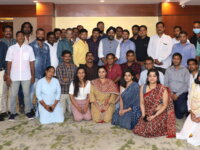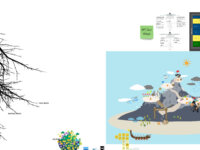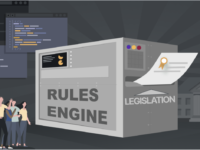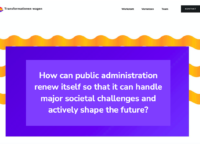Aapti's the Driver Advisory Council (DAC) represents a new framework for engagement between gig workers and platforms in the ride hail space - a first of its kind initiative in India. The larger aim of this innovation is to create a mechanism for platform governance that focuses on gig workers rights, enabling participatory action and reflexive praxis. To this end, we’ve engaged with public bodies such as India’s NITI Aayog to socialise the DAC and its novel approach to platform work.
Innovation Tag: Reframing Rules & Regulations
Governments provide a variety of financial help to people in need, with the eligibility/entitlement rules largely defined in legislation. But understanding those rules is incredibly hard, especially when under duress. This project is a community and social sector collaboration on a public, anonymous and interactive service that helps people know their legal rights to services & to an explanation from government, built upon a world first community reference implementation of legislation as code.
The Australian Government - Dept of Finance sponsored a Proof of Concept (PoC) that looked at how Rules as Code (RaC) might be provided as a shared utility that can be used to deliver simpler, personalised digital user journeys for citizens. RaC is the process of taking legislation and regulations and turning them into machine-readable code. It provides many benefits to citizens and government, including greater reuse, less duplication, greater transparency and accessibility of rules.
Democratic Technology brings governments and citizens into the 21st century. It empowers engagement in real time on daily issues, between people and politicians in a seamless and transparent way. Using geolocation or an address entry, real verified users are shown their government representatives on their smartphones enabling direct one-to-one messaging on important events. Collected anonymized data enables evidence based decision making for the public and governments.
Transformation Wagen - "Daring Transformations" is a learning programme co-developed with and for public servants in the field of Environmental Politics in Germany. Aiming at enhancing tools for public administration to renew itself, it creates capacities and methodologies to handle major societal challenges and foster a transformative mindset to actively shape the future and not just react to what is happening.
Creation of a functional prototype of a system, using AI, that assists the citizen in identifying and solving issues related to consumer law and retirement status.
We detect wicked problems and turn them into new spaces for innovation. It is a platform for all Estonian ministries, the public and the private sector, experts and entrepreneurs to join forces and build the future that we deserve. We are untapping new markets with a powerful but lean public-private collaboration.
The Government of Aruba developed a dynamic policy framework based on 10 key building blocks that jointly form a road map setting the direction for Aruba’s digitization strategy. The publication of the road map marks the culmination of the government’s preparatory implementation work over the past 3 years. At its core, the strategy is about meeting the needs of people within a service model that is fit for the demands of the 21st century.
The Internet's potential to enable micro, small and medium-sized enterprises (MSMEs) to conduct international commercial transactions has yet to be fully realised. With an emphasis on computational approaches to trade policy design and delivery, SUBREI has launched a pilot programme to contribute to an open repository of rules in a digital form: an 'Internet of Rules' (IoR).
The IoR will expand access to cross-border transactions and improve use by people and machines alike.
The Government of Korea has begun to implement a new Public Procurement of Innovation (PPI) policy, aiming to facilite the diffusion of innovation on the wider market. The Ministry of Science and ICT's new approach takes the existing innovation practice a step further by working in conjunction with associated public R&D projects to identify technological novelty and highlight potential social, economic impacts. This builds confidence for innovative companies and further facilitates public…






